US News
Read the Full Transcript of President Joe Biden’s Interview With TIME
Read our full cover story on President Joe Biden here. You can also read the full fact check here
President Joe Biden sat down for an interview with TIME at the White House on May 28.
Over the course of the interview, Biden spoke at length about his foreign policy agenda, including his views on China, Taiwan, Ukraine and Israel, as well as concerns about his age as he runs for re-election.
Below is a lightly edited transcript of the interview conducted by TIME Washington Bureau Chief Massimo Calabresi and Editor-in-Chief Sam Jacobs. Click here to read our fact check.
Thank you for doing this, Mr. President. We appreciate your time. Busy moment. I'll dive right in. You're traveling next week to Normandy for the 80th anniversary of D-Day to commemorate a turning point in America's leadership with the free world. But the anniversary comes at a time when the US under your leadership has been unable to deter crises. First in Afghanistan, then Ukraine, Israel, and mounting tensions in the Far East. Is America still able to play the role of world power that it played in World War Two, and in the Cold War?
Biden: Yes, we're planning even more. We are, we are the world power. And what I inherited, as a consequence of the mistake that we made in Afghanistan is a—was not a loss in Afghanistan, excuse my cold. But I think that look, I believe, I have a fundamentally different view than Mr. Trump has on a range of things. Number one: I really believe that we have a values-based as well as practical-based alliances around the world. And he, Trump, wanted to just abandon them. He says he's practical, one-on-one things he's doing.
Well, he didn't get much done. And so we end up in a situation where, when I came into, when I got sworn in, we were in a position where we didn't have—for example, there's a quote from Macron at the time saying that, in 2019, that Trump wants to eviscerate NATO. He thinks NATO is useless. And we have to rethink our entire relationship with the United States, they no longer lead the world.
I have that exact quote here. And they no longer lead the world and the transatlantic alliance has to be reexamined. And the interesting piece of that is you now have his former adviser John Bolton saying, he’s certain that the first thing Trump would do if he got reelected is get out of NATO completely.
And so I've always believed that there are two elements to American security, and the biggest element and, and our normative example, is our alliances, our alliances. We are—we have, compared to the rest of the world, we have put together the strongest alliance in the history of the world, number one. Number two, we're in a situation where we are able to move in a way that recognizes how much the world has changed and still lead the world. And it's our security. For example, the idea that if when Putin decided to go into Russia—I mean, he's gonna go from Russia into Ukraine—the reason why I cleared the intelligence so we can release the information we knew that he was going to attack, was to let the world know we were still in charge. We still know what's going on.
This, by the way is, if you haven't read it, you should. [Pulls out copy of speech Putin delivered on Feb. 21, 2022] It's the address to the Russian people on the Donbass problem on February 21, when Moscow was going in. And it lays out why I believe Trump—what he never understood—which is that Russia, he wasn’t just going into Moscow, I mean from Russia into Ukraine, for purposes of keeping them from having weapons, etc. He believes it is an essential part of Russia, from the beginning.
He has just laid out, straight out. He said, he said, ‘I would like to emphasize again, Ukraine is not a neighboring country of us. It is an inalienable part of our own History, culture and spiritual space…Since time immemorial, the people living in the south-west of what has historically been Russia, Russian land have called themselves Russians and Orthodox Christians.’ And he goes on. He makes this whole speech about why it is part of reestablishing the Soviet Union.
So understanding Putin's aims, the world, the West, the United States, and you find yourselves facing a difficult situation in Ukraine. The war is stalled every day, an average of 42 Ukrainian civilians are killed or wounded. Is Russia's proposal for, to end the war in Ukraine, the best that Ukraine can hope for at this point?
Biden: No, it's not. And by the way, I don't know why you skip over all that’s happened in the meantime. The Russian Military has been decimated. You don’t write about that. It’s been freaking decimated. Number one.
Number two, NATO is considerably stronger than it was when I took office. I put it together. Not only did I reestablish the fact that it was the strongest alliance in the History of the world, I was able to expand it. While I was in one of the G7 meetings in Europe. when I got back I called on the President of Finland because when I had met earlier in the year with Putin, he said he wanted to see the Finlandization of NATO. I told him, he's gonna get not the Finlandization, the Natoization of Finland. And everybody thought, including you guys, thought I was crazy.
And guess what? I did it. I did it. And we're now the strongest nation. We have the strongest alliance in all of America, all of history. In the meantime, what we keep skipping over is what the consequence of the success of Russia in Ukraine would be. That's why I brought this along. You probably haven't read it. Most people haven't read it. He says this is part of reestablishing the Soviet Union. That's what this is all about. It wasn't just about taking part of—He wanted, he wanted to go back to the, to the days when there was NATO and there was that other outfit that Poland, everybody belonged to. So that’s what it was about. And in the meantime, what happened was, we were able to—and by the way, we spent a lot of money in Ukraine, but Europe has spent more money than the United States has, collectively. Europe has spent more money than the United States has, collectively Europe has spent more money in taking on Russia.
So what is the endgame though in Ukraine and what does peace look like there?
Biden: Peace looks like making sure Russia never, never, never, never occupies Ukraine. That's what peace looks like. And it doesn't mean NATO, they are part of NATO. It means we have a relationship with them like we do with other countries, where we supply weapons so they can defend themselves in the future. But it is not, if you notice, I was the one when—and you guys did report it at TIME—the one that I was saying that I am not prepared to support the NATOization of Ukraine.
It should not, it is not—I spent a month in Ukraine when I was a Senator and Vice President. There was significant corruption. There was a circumstance that was really difficult. And so, the point is, though, that if we ever let Ukraine go down, mark my words: you'll see Poland go, and you'll see all those nations along the actual border of Russia, from the Balkans and Belarus, all those, they're going to make their own accommodations.
I want to switch to Israel. But on that last point, is there a danger that NATO is on a slippery slope to war with Ukraine—with Russia, as things stand?
Biden: No, we're on a slippery slope for war if we don't do something about Ukraine. It’s just not gonna…anyway…
So in Israel, obviously, a difficult time there. What steps are you prepared to take against Israel now that Netanyahu appears to have crossed your red line in Rafah, Mr. President?
Biden: I'm not going to speak to that now because you're going to report this before I make, before—I'm in the process of talking with the Israelis right now. So I'm not going to…
What does that mean?
Biden: If I tell you, you’ll write it. It’s not time for you to write it.
What are the nature of your conversations with the Israelis right now? Have you spoken with Bibi?
Biden: I have not spoken with Bibi since—I have not spoken with Bibi since the attack on Sunday. Was it Sunday?
Ben LaBolt: Yep. Sunday.
Biden: I have not. My team has.
But has he crossed your red line?
Biden: I'm not going to respond to that because I'm about to make a…anyway.
More broadly, from the intelligence in the evidence you've seen, either currently or in the last months, have Israeli forces committed war crimes in Gaza?
Biden: The answer is it's uncertain and has been investigated by the Israelis themselves. The ICC is something that we don’t, we don't recognize. But one thing is certain, the people in Gaza, the Palestinians have suffered greatly, for lack of food, water, medicine, etc. And a lot of innocent people have been killed. But it is—and a lot of it has to do not just with Israelis, but what Hamas is doing in Israel as we speak. Hamas is intimidating that population. I went over right after that attack on the Israelis. What they did was—exceeded anything I've ever seen. And I've seen a lot. Tying mothers and daughters together with rope and pouring kerosene on it and burning them to death. That kind of thing, attempting to intimidate. And it is dastardly.
On what Hamas has done, are the eight US hostages there in Gaza is still alive?
Biden: We believe there are those that are still alive. I met with all the families. But we don't have final proof on exactly who's alive and who's not alive. And by the way, I’ve been calling for—we should have a ceasefire, period. And to get those hostages. That’s the main reason why we push. Both the Israelis desperately want a ceasefire in order to get the hostages home. And it's a way to begin to break the momentum. And so that's why we're pushing hard for the—and we’re—Is our intelligence chief in? Where is he now?
Kirby: He is back, sir. He was just over in Europe, in Brussels, over the weekend.
And whose fault is it that the that deal, the ceasefire for hostages has not been consuMMAted? Is it Hamas or Israel or both?
Biden: Hamas. Hamas could end this tomorrow. Hamas could say (unintelligible) and done period. And, but, and the last offer Israel made was very generous in terms of who they'd be willing to release, what they'd give in return, et cetera. Bibi is under enormous pressure on the hostages, on the hostages, and so he's prepared to do about anything to get the hostages back.
You mentioned the hunger in Gaza. Some have alleged that Israel is intentionally using starvation of civilians as a method of warfare. Do you think that's the case?
Biden: No, I don't think that. I think they've engaged in activity that is inappropriate. That is…When I went over immediately after the—Hamas’ brutal attack, I said then, and it became public, I said, don't make the same mistake we did going after bin Laden. Don't try—The idea of occupying Afghanistan, the idea that you had nuclear arsenals in Iran, that were being, I mean, in Iraq, that were being generated, simply not true. And it led to endless wars. They were not true. Don't make the mistakes we made. And they're making that mistake, I think. Excuse my voice, I apologize.
Not at all. Some in Israel have suggested that Netanyahu is prolonging the war for his own political self-preservation. Do you believe that?
Biden: I'm not going to comment on that. There is every reason for people to draw that conclusion. And I would cite tha as—before the war began, the blowback he was getting from the Israeli military for wanting to change the constitu—change the court. And so it's an internal domestic debate that seems to have no consequence. And whether he would change his position or not, it's hard to say, but it has not been helpful.
Trump has said that Netanyahu is rightfully criticized for Oct. 7. Do you believe that he bears some responsibility for the fact that Oct. 7th happened?
Biden: I don't know how any one person has that responsibility. He was the leader of the country, so therefore, it happened. But he wasn't the only one that didn't pick it up. He wasn’t the only one that didn’t pick it up. That's why there's got to be—my major disagreement with Netanyahu is, what happens after, what happens after Gaza’s over? What, what does it go back to? Do Israeli forces go back in? I've been talking to the Egyptians and been talking to the Saudis. I’ve been talking to the Jordanians, I've been talking to the Emiratis. The answer is, if that's the case, it can't work.
There needs to be a two-state solution, a transition to a two-state solution. And that's my biggest disagreement with Bibi Netanyahu.
Do you have agreement from all the other parties to this multi-part package of deals that would deliver that in Israel, in the region, other than Bibi? Is Bibi the only thing standing in the way of that?
Biden: I gotta be careful, because you're gonna print this before the article comes out and I'm in the process of negotiating a lot of that. The answer is that I think there is a clear path for a transition where the Arab states would provide security and reconstruction in Gaza in return for a longer-term commitment to a transition to a two-state solution. And that extends all the way from Saudi Arabia, who I continue to talk to—my team—to the Jordanians that are trying to work bringing in goods and certain goods now, food, medicine, etc. And the Egyptians who I've been talking with frequently about what happens in terms of access for more material to get into Gaza to prevent this catastrophe from continuing.
Mr. President, you mentioned at the beginning value-based alliances, and you mentioned the Saudis. Do you believe we share the same values?
Biden: Remember, I said what the other one was: there are values-based and there are practical-based. And it's overwhelmingly in our interest. For example, you may recall a resolution I introduced at the G20 that no one thought would go anywhere and it passed by providing for a railroad and oil line, uh, oil, excuse me, I misspoke. Railroad lines and transportation, all the way from Riyadh—to Saudi Arabia, to Jordan, to Israel, all through Europe and continuing. And the reason for that is that the economy can be used to bring people together as well. The fact of the matter is the world's changing. We are at a significant inflection point.
The Saudis are aware that oil is not going to be their ticket to the future 10 years from now. They know it. They know what's happening. The same way with the rest of these countries. So if you have mutual economic interests in mind, you’re less likely to have conflict. So that's what—and it passed, by the way, that resolution.
We have a lot of the world to cover. Elsewhere in the region in Iran, but also in the Far East, there are troubling national security developments, long-standing problems that appear to be getting worse, Iran is expanding its stockpile of enriched, highly enriched uranium. North Korea has reportedly restarted its nuclear program and is testing missiles capable of reaching the mainland US, some even as far as New York potentially. Is it effectively American policy now to live with a nuclear or near-nuclear Iran and North Korea?
Biden: No, it's not. And by the way, that's been going on for some time. You could have sat here five years ago and said the same thing with regard to North Korea. So…
But that situation is getting more threatening, don't you think, Mr. President?
Biden: No, I don't. I think it's equally as threatening as it was before. I don't think it's more threatening and North Korea has something else that it has to deal with. I did something that you would have been too cynical to think I could possibly do. I put together an Indo-Pacific strategy that is incredibly broad.
Did you ever think if I told you that Japan would be devoting 3% of its GDP to defense and make a rapprochement at Camp David with South Korea as an overwhelming threat that exists to North Korea as well as to Europe? You know, I've been able to put 50 nations together to help in Ukraine, led by us but also engaged with, with Japan's leadership.
So there is—look as long as there are nuclear weapons available, it's always going to be a problem. It's gonna—the question is how do we stop it? That's why I thought Trump was wrong in not wanting to work early on five years ago, and three years ago, when he left office—with trying to control, work out an arrangement to control access to North Korea, to nuclear weapons and/or nuclear weapons that are available to any other area. And that's why I was able to put together four or five major initiatives in Europe. I put together a quad that never existed before. I put together—I mean personally put together—worked on it, I put together AUKUS with Great Britain and Australia. I put together an agreement between Japan and the Philippines dealing with making sure that we know the international rules of the road pertaining in terms of air and water and territorial integrity.
And so the point is we've invested billions of dollars. We are much stronger in the Pacific than we ever were before. China, by the way, China is very concerned about it. They asked me—I’ve spent more time with Xi Jinping than any leader in the world, over 90 hours alone with him since I've been Vice President. And we have a very candid relationship.
You know, I don't have any (unintelligible) He wanted to know why I was doing all these things. I said the simple reason I’m doing those things: to make sure that you don’t, that you aren’t able to change the status quo any.
So getting to exactly that point. Pretty much everybody agrees that managing China's rise is the most important foreign policy and national security issue for America and Americans in the coming century. CIA director Bill Burns says the President Xi Jinping of China has ordered the Chinese military to be ready by 2027 to conduct a successful invasion of Taiwan. You said on multiple occasions that you would use US forces to defend Taiwan. What does that mean? Is it boots on the ground? What, what shape would that take?
Biden: It would depend on the circumstances. You know, by the way, I've made clear to Xi Jinping that we agree with—we signed on to previous presidents going way back—to the policy of, that, it is we are not seeking independence for Taiwan nor will we in fact, not defend Taiwan if they if, if China unilaterally tries to change the status. And so we're continuing to supply capacity. And, and we've been in consultation with our allies in the region.
So if I might, not ruling out the possibility of deploying US troops to Taiwan in the case of an invasion?
Biden: Not ruling out using US military force. There’s a distinction between deploying on the ground, air power and naval power, etc.
So you're maybe striking from bases in Philippines or Japan, is that…
Biden: I can’t get into that. You would then criticize me with good reason if I were to tell you.
The competition in the Pacific Rim is broader than hard power and you've expanded Donald Trump's trade war with China. Mr. President, which you once criticized.
Biden: No, I haven’t. Go ahead.
Most economists say tariffs raise prices.
Biden: They do.
Cumulative inflation means that prices are up 18%, at least since you took office and wage increases have not kept pace.
Biden: Since who took office? Since I took office?
Yeah, cumulative iNFLation means prices are up nearly 20% since you took office and wage increases have not kept pace.
Biden: Wage increases have exceeded what the cost of inflation, which you're talking about as the prices that were pre-COVID prices. Pre-COVID prices are not the same as whether or not they—you have American, corporate America ripping off the public now. You have everything from shrinkflation to what's going on in terms of the way in which they're artificially moving significantly to increase their, their, their, their, their profits. That's not the same as inflation. That's price gouging.
But Mr. President, won’t your newly announced tariffs raise the prices on American consumers?
Biden: No, because here's the deal. There's a difference. I made it clear to Putin from the very beginning that—I'm not, we're not engaging in…For example, Trump wants a 10% tariff on everything. That will raise the price of everything in America. [Editor’s note: Biden appeared to mean Xi here, not Putin.]
What I'm talking about, I said, we're gonna play by the same rules. You tell me if I want to, if an American corporation wants to invest in China, it has to give 50% ownership, 51% ownership to a Chinese operator. And that goes on from there. And I said, so you're gonna do that to us? (unintelligible) We’re going to do the same thing if you want to invest here. We're not putting a tariff on. We’re just saying, if you want to do that, well, we're gonna do that. And you cannot change the market in a way where you flood the market by—ignore all Chinese government subsidies to undercut their ability as to deal with electric vehicles. And we're not going to put up with it. That’s the thing we talked about. And that's what we're talking about. We're not talking about tariffs across the board.
Okay, I'm gonna do a couple of rapid fire here. Another of your first acts as President under the banner of value-based leadership was to lift various punitive Trump-era immigration measures, Mr. President, that you and others said were inhumane. In retrospect, do you think those humanitarian moves helped drive record illegal border crossing?
Biden: No.
Were you wrong to lift any of those measures?
Biden: If I was wrong, it’s because I took too long,
You've put some back in place. The Green Card issue, it's been reported that you're looking at reinstating Remain in Mexico. Are you looking at reinstating…
Biden: No
The last two years of Presidents, two-term President's tenure are usually focused on foreign affairs. You are 81 years old, and would be 86 by the time you left office. Large majorities of Americans, including in the Democratic Party, tell pollsters they think you are too old to lead. Could you really do this job as an 85-year old man?
Biden: I can do it better than anybody you know. You’re looking at me, I can take you too.
Did you consider not running again because of your age?
Biden: No, I didn't.
And what do you say to Americans who are worried about it?
Biden: Watch me. Look, name me a president that’s gotten as much done as I've gotten done in my first three and a half years. When all of you wrote in Time magazine I couldn't get any of it done. When you told me there's no pay, no way, no way he can get a trillion-plus dollar bill done in terms of, to deal with infrastructure, where there's no way he gets $368 billion for dealing with the environment, where there's no way I could get the, the, the legislation passed on.
I remember when I was heading to Taiwan, excuse me, to South Korea, to reclaim the chips industry that we had gotten $865 billion in private-sector investment, private-sector investments since I’ve been in. Name me a president who’s done that.
You pledged at the beginning to restore unity. Both Trump and top Democrats, including some of your aides, say the greatest threat to America's national security is its—and its ability to lead the free world comes not from abroad, but from within, from US politics. Do you agree with that?
Biden: I think it has a significantly diminishing impact on our ability to get things done internationally. Look, I tell you, I’ll just—let me give you one example. After I was elected, the first G7 I attended as President was in, in London—in England, along the beach down there. And I sat down with the seven leaders that were there. And I was sitting where you were, at this longer table.
I said, “Well, America's back.” Macron looked at me and he said, “For how long? For how long?” And then Schultz said to me, “What would you say Mr. President, if tomorrow you pick up The London Times and found out that thousands of people stormed the British Parliament, broke down the doors, killed two Bobbies to prevent the implement—the swearing in of a, of a prime minister, a choice of prime minister?”
And it made me realize just how fundamentally what he allowed to happen sitting in this room, looking at that television for three hours and didn't do a damn thing, said about America, and how much confidence people lost in America. There's not a, there’s not a…I’m gonna, say, be careful what I say…There's not a major international meeting I attend that before it’s over—and I've attended many, more than most presidents have in three and a half years—that a world leader doesn’t pull me aside as I’m leaving and say, “He can’t win. You can’t let him win.”
My democracy and their democracy is at stake. My democracy is at stake. And so name me a world leader other than Orban and Putin who think that Trump should be the world leader in the United States of America.
LaBolt: We’ll have to leave it there.
Let me ask you one on the…if you do win in November, Mr. President, with a mandate to continue your approach to foreign policy, what would your goals be in the second term?
Biden: To finish what I started in the first term. To continue to make sure that the European continent—I'll tell you, I got a call from Kissinger about 10 days before he died. And he used the following comment. He said that not since Napoleon has Europe not looked over their shoulder at dread with what Europe—what Russia may do, until now. Until now, you can't let that change.
The point is that we have an opportunity to have the decisions we make in the last couple of years, in the next four years, are going to determine the future of Europe for a long time to come. And so that's why we can not let NATO fail, we have to build that both politically and economically. And militarily, which we're investing significantly. In addition to that, I am desperately focused on making sure that we deal with the…what they are calling the south now. There are going to be a billion people in Africa in the next several years. We have to, we have to be a catalyst for change for the benefit, for the, for the better, we have to help them build back better, we have to help them.
We, on the climate side, have come along and we've done everything that is reasonably—and three other countries are the reason we’re in the problem we’re in. But what happens if all of a sudden, on the Amazon, they're starting to clear, vast swaths of land, cut down forests, etc. Back when Dick Lugar was alive, he and I started something back in the 90s, where we said—late 80’s, excuse me—where we said to, in the Amazon, they said, look, if you, we’ll make a deal with you Brazil. You don't cut your forest, we'll pay you not to do it. We’ll pay you not to do it, We have to prevent—And that's why we're working so hard to make sure Angola can be in a position that they have more solar capacity than almost any place in the world, to help that whole continent.
That's why we want to build a railroad all the way—with others in Europe—all the way across the continent. So that you have, you have countries that have overproduction of agriculture and some that don’t have it, but no way to get a transfer. There's so much opportunity in Africa. And we have to work it.
In addition to that, we have to deal with the Indo-Pacific. I've had 15 island presidents and leaders here twice now. They know if they—if we don't do something about global warming, a couple of them are going to be underwater. I mean, literally underwater, not to—So we're putting together coalitions of people that have a similar interest. And it makes it difficult. You know, you're talking, everybody talks about how, how strong China is and how powerful they are. Name me—Would you trade places with Xi Jinping and any other country? Not a joke? I'm being deadly earnest, a rhetorical question. But would you? You’ve got a population that’s considerably older than the vast majority of the youth in Europe, that is too old to work. And they are xenophobic. Where is it coming from? Where is it going to grow? You’ve got an economy that's on the brink there. The idea that their economy is booming? Give me a break.
I do have one last on China, which is are they meddling in the election? Have you seen evidence that they're meddling with AI or in other ways in the US election?
Biden: There, there, there, there is evidence that meddling is going on. I'm not going to get into, I don't think I should from an intelligence standpoint, there…
It sounds as if they are.
Biden: I think China would have an interest—let me put it like this—would have an interest in meddling. Everybody, all the bad guys are rooting for Trump, man. Not a joke. Think about it. Think about it. I mean, that line that Macron used, and it says that…I was making notes for this. It said, Macron, they know the experience of brain death unlike anytime. Because lack of US leadership, we should reassess the reality of NATO in light of the lack of US leadership.
You know, we talked about what they're looking at in terms of Asia. One thing that I was able to convince the Japanese of, is we're not walking away from Japan. Because Japan, collected with us, is a source of great economic strength and stability, physical stability for both of us. You're not going to have, I mean, the idea that China wants to screw with everybody is a different place. By the way, the cost of China to build their military is multi-billions of dollars.
And guess what they're, you know, they're, they’re…what they call it? Going around the world? The Belt and Road initiative? It's become a nuisance graveyard initiative. I'm serious. Think about it. I've been saying this for three years, and you guys write, “No, China’s on the right—China’s gonna break through.” Where are they, where are they breaking through? And look what's happening in Africa.
Well, I could I could go on with that question for a long time, Mr. President, thank you very much I've taken—
Biden: After this is all over, I'm happy to talk with you. For real.
-
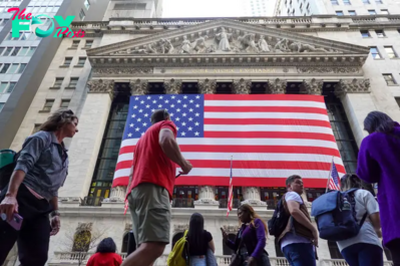
 US News1d ago
US News1d agoFlorida Man Arrested and Charged With Planning to Bomb the New York Stock Exchange
-
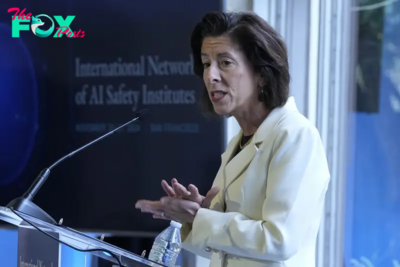
 US News1d ago
US News1d agoU.S. Gathers Global Group to Tackle AI Safety Amid Growing National Security Concerns
-
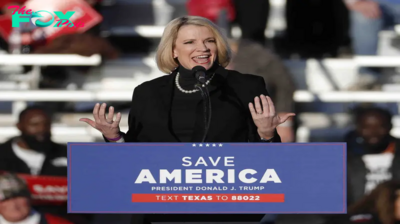
 US News2d ago
US News2d agoTexas Offers Trump Land on U.S.-Mexico Border for Potential Mass Deportations
-

 US News2d ago
US News2d ago4B Is Not the Winning Strategy to Resist the Patriarchy People Think It Is
-
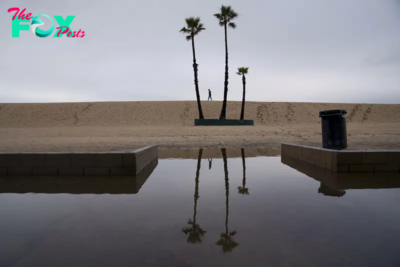
 US News2d ago
US News2d ago‘Bomb Cyclone’ Threatens Northern California and Pacific Northwest
-
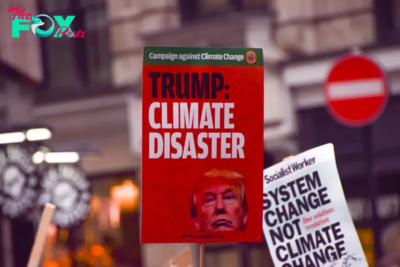
 US News2d ago
US News2d agoClimate Action in Trump 2.0
-

 US News2d ago
US News2d agoWhat Victoria Woodhull’s Presidential Run Can Teach Us About America Today
-
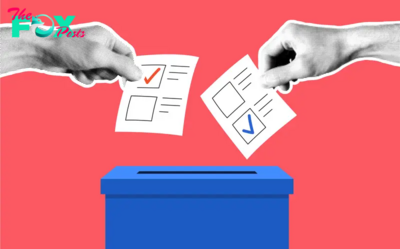
 US News3d ago
US News3d agoThese Races Still Don’t Have a Clear Winner Two Weeks After Election Day



















